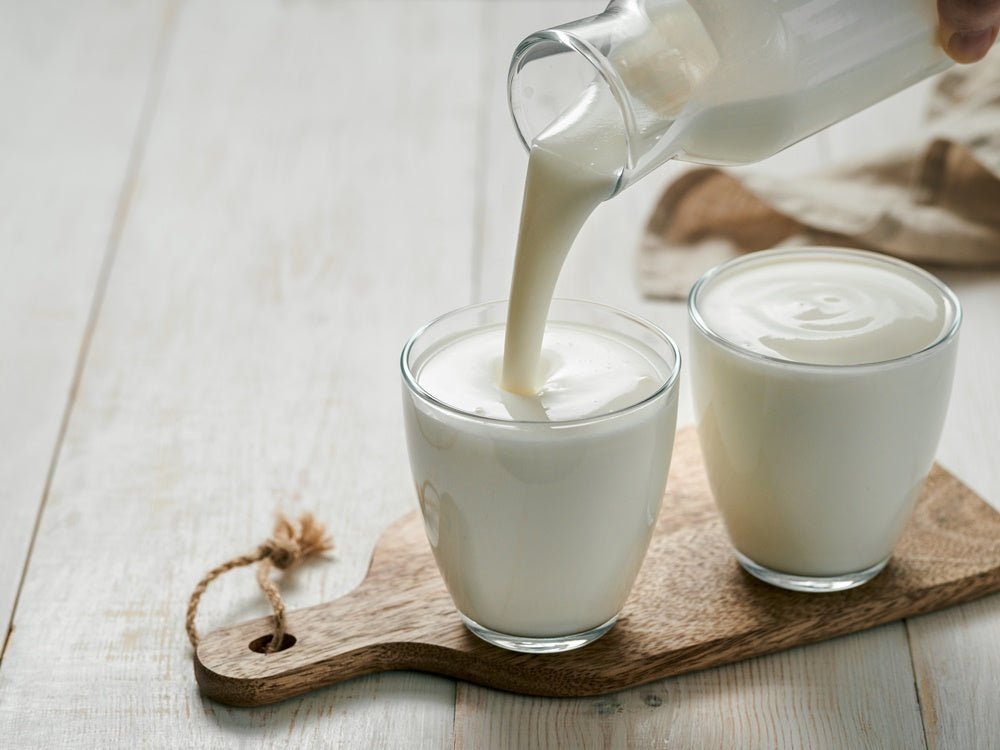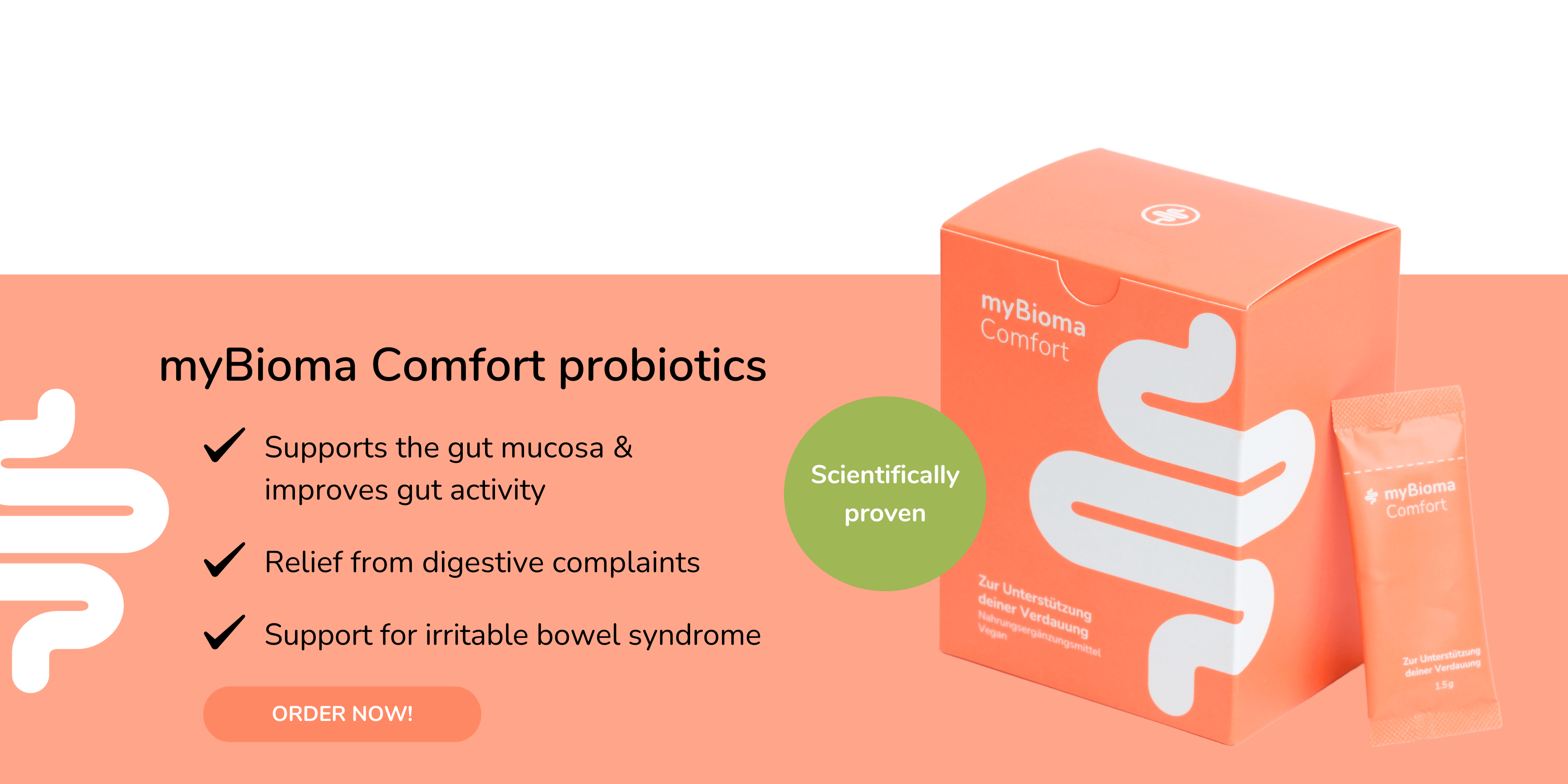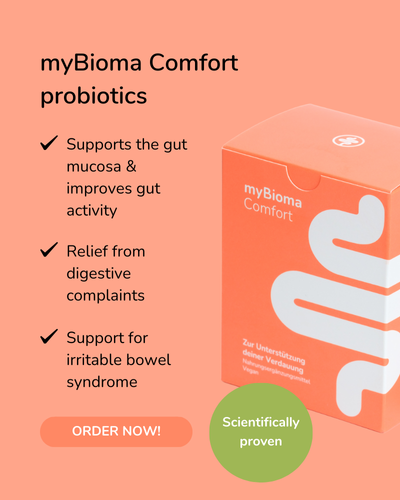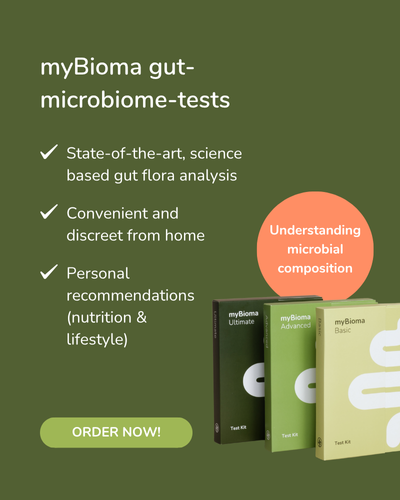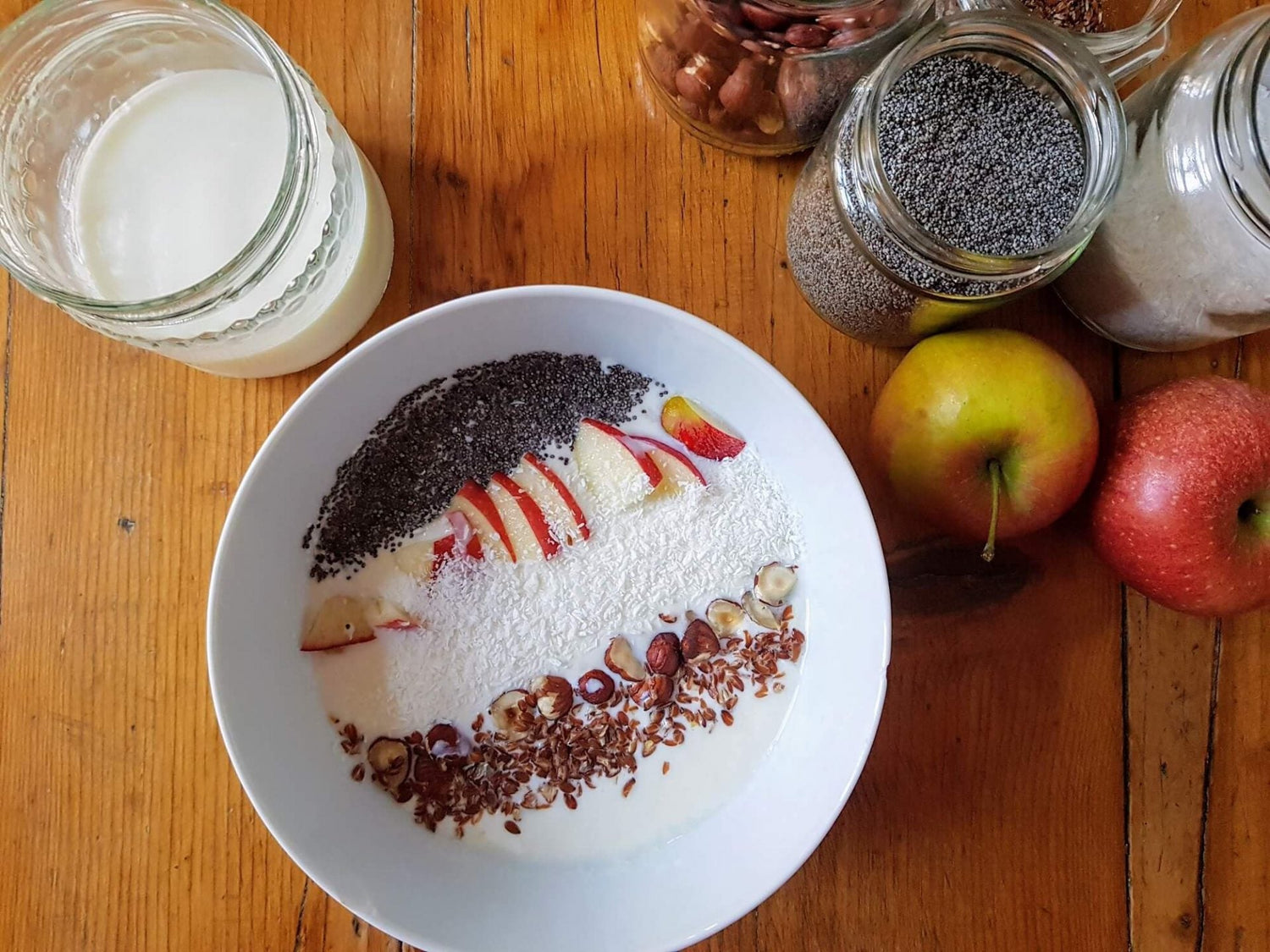When you hear the word "germs," you might think of dangerous pathogens. However, many bacteria are completely harmless and even beneficial to us! Take lactobacilli, for instance - they support our health and can help prevent diseases. Haven't heard of them? You've likely encountered them in your diet before, as they are found in foods like yogurt and sauerkraut.
What exactly are lactobacilli?
Lactobacilli, also known as lactic acid bacteria, are a genus of probiotic bacteria that colonize various parts of our body, primarily the intestine, vagina, and mouth. These beneficial bacteria perform essential functions that contribute significantly to our health (1).
The Lactobacillus genus comprises various gram-positive, facultatively anaerobic rod-shaped bacteria. This means they can thrive in both the presence and absence of oxygen. They are named for their ability to efficiently convert lactose (milk sugar), making them valuable in the production of yogurt and similar products (2).
Which lactobacilli promote health?
As of 2020, there are approximately 261 species of Lactobacilli, categorized into 25 genera (3). The most well-known Lactobacillus species, along with their potential positive effects on the human body, include (2):
| L. rhamnosus |
Prevention and treatment of vaginosis, antidiabetic potential, treatment of acute gastrointestinal diseases. |
| L. acidophilus |
Treatment of traveler's diarrhea, prevention and treatment of vaginosis, relief of symptoms of irritable bowel syndrome (IBS). |
| L. plantarum |
Relief of IBS symptoms, prevention of fungal infections, support of the immune system by inhibiting the formation of inflammatory substances (endotoxins). |
| L. casei |
Treatment of gastrointestinal diseases such as constipation and diarrhea, restoration of a healthy vaginal flora after vaginosis, support of the immune system. |
| L. delbrueckii subsp. Bulgaricus |
Use in the production of yoghurt, supports the immune system, antibacterial effect against pathogenic E. coli bacteria. |
| L. brevis |
Supporting the body in tolerating bile salts. |
| L. johnsonii |
Support of the immune system, especially against respiratory diseases, minimizing the occurrence of gastritis. |
| L. fermentum |
Prevention and treatment of vaginosis, prevention of the adhesion of pathogenic (disease-causing) bacteria in the vagina and support in the reduction of insulin resistance and hypercholesterolemia. |
| L. reuteri |
Lowering LDL cholesterol in the blood, treating colic and gastrointestinal diseases in children. |
How do lactobacilli affect health?
Lactobacilli are probiotic bacteria. You can learn what "probiotic" means in our blog article about probiotics and prebiotics. Probiotic bacterial strains, especially lactobacilli, offer numerous benefits and impact our health and gut microbiome in various ways (4):
-
Supporting gut health: Lactobacilli produce antimicrobial substances like hydrogen peroxide and bacteriocins, which inhibit or kill pathogens.
-
Positive influence on the gut microbiome: They inhibit the growth of harmful bacteria while promoting the multiplication of beneficial bacteria.
-
Improved digestion: They ferment indigestible carbohydrates, reducing bloating and intestinal discomfort.
-
Strengthening the gut barrier: By producing short-chain fatty acids, lactobacilli help seal the intestinal wall, preventing viruses and pathogens from entering the body and causing disease.
-
Supporting the immune system: Lactobacilli play a crucial role in the development of the immune system in childhood and interact with the immune system to support it in adulthood.
-
Promoting a healthy vaginal flora: In the vagina, lactobacilli displace pathogens and maintain a low pH value through lactic acid production, making it difficult for harmful bacteria to multiply. Did you know the intestinal microbiome is closely linked to women's health? Learn more in our blog post: Exploring the intersections of women's health and the gut.
-
Support for Various Diseases: Lactobacilli can relieve symptoms of irritable bowel syndrome, acute gastrointestinal issues such as constipation or diarrhea, and more.
The effects of various lactobacilli are currently the subject of intensive research. While the focus was previously on pathogenic (disease-causing) bacteria, beneficial bacteria are now gaining more attention. For instance, the strain Lactobacillus plantarum 299v is believed to have significant therapeutic potential. Studies have shown that it is effective in the long-term treatment of irritable bowel syndrome (4–6), in alleviating symptoms following antibiotic use (7), and in strengthening the immune system against viral infections (8). Additionally, a randomized controlled study found that taking Lactobacillus plantarum 299v increased iron absorption by 70% in female athletes with iron deficiency (9).
Due to its scientifically proven effectiveness and excellent tolerability, our probiotic myBioma Comfort features the bacterial strain Lactobacillus plantarum 299v. This strain is also resistant to stomach acid, allowing it to reach the large intestine without the need for acid-resistant capsules and can establish itself there.
How do lactobacilli get into the body?
The first contact with lactobacilli usually occurs at birth, as these bacteria are part of the vaginal flora. During a natural birth, a newborn encounters numerous lactobacilli in the birth canal, ensuring the first contact with probiotic bacterial strains. In contrast, during a cesarean section, there is no contact with the vaginal flora, so exposure to lactobacilli happens a bit later and in a different manner, such as through breast milk. Breast milk is rich in probiotic bacterial strains like lactobacilli and bifidobacteria (10,11). If you want to learn more about the development of the child's gut microbiome, visit our blog article on children's gut health.
Intake of lactobacilli through diet
Some lactobacilli are used in food production. Common examples include fermented dairy products like yogurt, kefir, and cheese. They are also used in the production of sauerkraut, kimchi (which you can easily make yourself), pickles, and certain types of wine (2).
The benefit is that these lactobacilli remain viable in the food and can reach our gut, where they exert their positive effects. However, it's important to ensure that the food is natural and has not been heat-treated (12). Heating sauerkraut, for instance, can kill these beneficial bacteria, preventing them from reaching the large intestine. For lactobacilli to thrive in the gut, they also need the right "food" in the form of prebiotic foods (12).
Intake of lactobacilli via dietary supplements
Another effective way to obtain lactobacilli is through dietary supplements. These probiotics are available in various forms, such as powders, capsules, or liquids, and the living bacteria can exert their beneficial effects in the gut (14).
However, the effectiveness of probiotics can vary from person to person, partly because each individual's gut microbiome is unique. It can be helpful to first assess how well your gut is already populated with lactobacilli. With a microbiome analysis from myBioma, you can easily determine the composition of your microbiome from home and identify which steps are most relevant for enhancing your gut health.
Practical nutritional tips to support lactobacilli in your body
The following points can help you enrich your gut microbiome with lactobacilli and create an environment in which they feel comfortable. Here are some tips to help enrich your intestinal microbiome with lactobacilli and create a supportive environment for them:
- Consume probiotic foods: Incorporate foods rich in lactobacilli, such as yogurt, kefir, sauerkraut, kimchi, and miso paste, into your diet several times a week.
- Choose natural foods: Ensure that these probiotic foods are natural and have not been heat-treated, as heat can destroy beneficial bacteria.
- Provide prebiotics: Feed lactobacilli with prebiotic foods or supplements. Prebiotics help these beneficial bacteria thrive in your gut.
- Maintain a Gut-Friendly diet: Follow a diet that supports gut health, rich in fiber and diverse nutrients.
- Adopt a healthy lifestyle: Avoid factors that negatively impact gut health, such as excessive alcohol consumption, smoking, lack of exercise, and insufficient sleep.

Dos & Dont's for happy lactobacilli in the gut.
Fermenting food with lactobacilli - here's how!
The power of lactobacilli is harnessed in the production of many fermented foods such as yogurt, buttermilk, kefir, cheese, kimchi, and sauerkraut. These bacteria convert carbohydrates and produce vitamins, minerals, and antimicrobial substances. The fermentation process not only extends the shelf life of these foods but also enhances their flavors and makes them easier to digest.
The result:
- A food (e.g. yoghurt or cheese) which contains less sugar than the original substance as the lactobacilli have “eaten” it.
- Longer shelf life due to the low pH level and the lactobacilli’s ability to inhibit other bacteria.
- When consumed, lactobacilli from these foods enter the intestines and can provide health benefits.
- Development of distinct aromas and flavors.
By the way: Fermentation is also why some lactose-intolerant individuals can tolerate certain cheeses. For instance, hard cheeses undergo a lengthy aging process that allows bacteria to break down lactose, making it less problematic.
You can find more information about fermentation and one of our favorite recipes in this blog: Simple Kimchi Recipe: Fermentation foods for better gut health or in our extensive recipe e-book "Microbiome Food" .
Summary
Lactobacilli are valuable allies in supporting your health. You can include them in your diet or take them as dietary supplements to benefit your gut microbiome, immune system, and overall well-being.
References
- Heeney DD, Gareau MG, Marco ML. Intestinal Lactobacillus in health and disease, a driver or just along for the ride? Current Opinion in Biotechnology. 2018 Feb;49:140–7.
- Fijan S. Microorganisms with Claimed Probiotic Properties: An Overview of Recent Literature. IJERPH. 2014 May 5;11(5):4745–67.
- Zheng J, Wittouck S, Salvetti E, Franz CMAP, Harris HMB, Mattarelli P, et al. A taxonomic note on the genus Lactobacillus: Description of 23 novel genera, emended description of the genus Lactobacillus Beijerinck 1901, and union of Lactobacillaceae and Leuconostocaceae. International Journal of Systematic and Evolutionary Microbiology. 2020 Apr 1;70(4):2782–858.
- Dempsey E, Corr SC. Lactobacillus spp. for Gastrointestinal Health: Current and Future Perspectives. Front Immunol. 2022 Apr 6;13:840245.
- Ducrotté P. Clinical trial: Lactobacillus plantarum 299v (DSM 9843) improves symptoms of irritable bowel syndrome. WJG. 2012;18(30):4012.
- Krammer H, Storr M, Madisch A, Riffel J. Irritable bowel syndrome treatment with Lactobacillus plantarum 299v: Longer use increases treatment success – results of a non-interventional study. Z Gastroenterol. 2021 Feb;59(02):125–34.
- Lönnermark E, Friman V, Lappas G, Sandberg T, Berggren A, Adlerberth I. Intake of Lactobacillus plantarum Reduces Certain Gastrointestinal Symptoms During Treatment With Antibiotics. Journal of Clinical Gastroenterology. 2010 Feb;44(2):106–12.
- Berggren A, Lazou Ahrén I, Larsson N, Önning G. Randomized, double-blind and placebo-controlled study using new probiotic lactobacilli for strengthening the body immune defense against viral infections. Your J Nutr. 2011 Apr;50(3):203–10.
- Axling U, Önning G, Combs MA, Bogale A, Högström M, Svensson M. The Effect of Lactobacillus plantarum 299v on Iron Status and Physical Performance in Female Iron-Deficient Athletes: A Randomized Controlled Trial. Nutrients. 2020 Apr 30;12(5):1279.
- Kim H, Sitarik AR, Woodcroft K, Johnson CC, Zoratti E. Birth Mode, Breastfeeding, Pet Exposure, and Antibiotic Use: Associations With the Gut Microbiome and Sensitization in Children. Curr Allergy Asthma Rep. 2019 Apr;19(4):22.
- Akagawa S, Akagawa Y, Yamanouchi S, Kimata T, Tsuji S, Kaneko K. Development of the gut microbiota and dysbiosis in children. Bioscience of Microbiota, Food and Health. 2021;40(1):12–8.
- Maftei NM, Raileanu CR, Balta AA, Ambrose L, Boev M, Marin DB, et al. The Potential Impact of Probiotics on Human Health: An Update on Their Health-Promoting Properties. Microorganisms. 2024 Jan 23;12(2):234.
- Leroy F, De Vuyst L. Lactic acid bacteria as functional starter cultures for the food fermentation industry. Trends in Food Science & Technology. 2004 Feb;15(2):67–78.
- Bischoff SC, editor. Probiotics, prebiotics and synbiotics [Internet]. Stuttgart: Georg Thieme Verlag; 2009 [cited 2024 May 18]. Available from: http://www.thieme-connect.de/products/ebooks/book/10.1055 /b-002-29652


